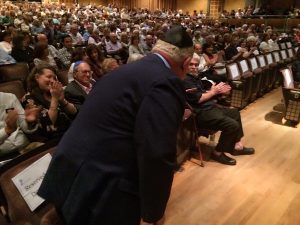When Shalom Netanel Ouanounou passed away on March 8 after six months on life support, the court case to determine whether he was legally dead or alive was still unresolved.
Doctors at Humber River Hospital in Toronto contended that he was brain dead and should be disconnected from life support. His family argued that his heart and lungs were still functioning and that under Jewish law, he was still alive and should therefore continue to receive the benefit of mechanical intervention.
While the Ouanounou family still hasn’t heard whether an Ontario Superior Court judge will make a decision in their son’s case – which will no doubt affect other Jewish patients in the future – a different judge from the same court ruled on June 26 that the Christian beliefs of Taquisha McKitty should not impact the medical decision over whether to remove her from life support.
In a 111-page judgment that touched on the common law definition of death, religious beliefs, charter rights, charter values and even on the concept of the soul, Judge Lucille Shaw ruled that McKitty is brain dead and could be removed from mechanical ventilation. She suspended the order pending a 30-day appeal period, during which the McKitty family can take the case to a higher court.
Shaw ruled that while Ontario does not have a statutory definition of death, physicians in the province and across the country define death by the cessation of neurological functions.
Asked to consider whether the common law definition of death violated the values underpinning the charter, such as McKitty’s religious beliefs, the court noted that it was being asked to break new ground.
READ: NETANEL OUANOUNOU DIES AFTER SIX MONTHS ON LIFE SUPPORT
“This is the first instance where the court has been asked to consider the values associated with the common law definition of death. I find that the values that underlie the common law is a definition of death that provides predictability, objectivity and certainty for those who provide medial service but also for patients and family members,” Shaw wrote in her judgement.
As to whether those values clashed with McKitty’s freedom of religion, which holds that a person is alive as long as the heart is beating, Shaw stated: “The neurological determination of death does not inhibit or prevent persons from holding the belief that death occurs when the heart stops beating. The state’s duty is to protect the freedom to hold that religious belief and to manifest it in worship and practice or by teaching or dissemination. While the freedom to worship is protected, the spiritual focal point of worship is not protected.
“The common law definition of death as including brain death is not inconsistent with the charter value of religious belief to believe in the soul and to manifest that belief. This is because the charter value of religious freedom does not extend to protecting the object of the belief, which, in this case, is the soul.”
Shaw addressed an argument presented in the Ouanounou case, which asked for a religious accommodation similar to one offered in New Jersey, where hospitals are required to consider patients’ religious beliefs about death.
Shaw rejected that argument, saying that “the New Jersey legislation is of limited assistance as it does not address some significant policy considerations such as what, if any, medical intervention is required to maintain the cardio-respiratory system and if it extends beyond mechanical ventilation.”
The judge stated that McKitty is taking up a space in the hospital’s intensive-care unit (ICU) and that the court heard about “a lack of ICU beds for post operative care as a result of Ms. McKitty being maintained in the ICU at the hospital. There was also evidence that patients requiring ICU beds were being managed in other non-specialized areas of the hospital which cannot provide the same level of specialized care available at the ICU.

“It is reasonable to conclude that there would be significant costs to provide medical support for someone whose religious belief is that death only occurs when there is a cessation of cardio-respiratory function. Those costs would escalate if additional medical intervention is needed to maintain the body and/or as other organs fail and arguably must be maintained so long as the heart is beating.”
Hugh Scher, the lawyer who represents the families in both the Ouanounou and McKitty cases, said that while there are differences in each case, they both raise important legal issues about the definition of death and accommodation of patients’ religious beliefs.
Scher said the judge in the Ouanounou case has not informed the family or Humber River Hospital of whether he will render a decision. Both parties have asked him to do so, in order to clarify the law going forward.
But, Scher continued, it’s likely the parents in the McKitty case will appeal the decision to the Ontario Court of Appeal. And if the judge in the Ouanounou case provides a decision, that case could be joined with the Ouanounou case before the appellate court.
During hearings in the Ouanounou case, hundred of people from the Jewish community flocked to the University Avenue court house to demonstrate support for Ouanounou and his family, and to show the court that its decision will have an impact on the wider Jewish community.








